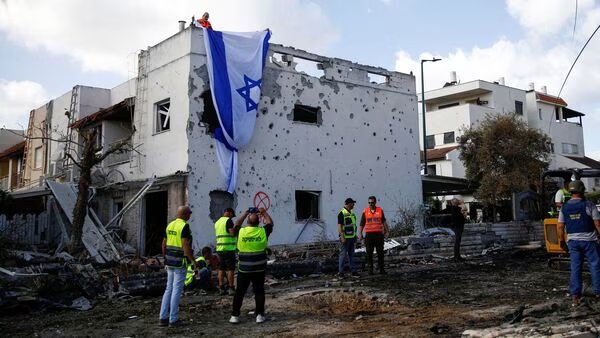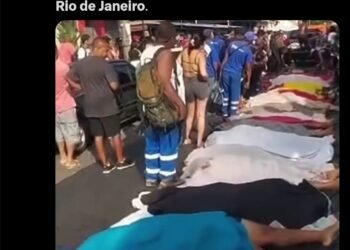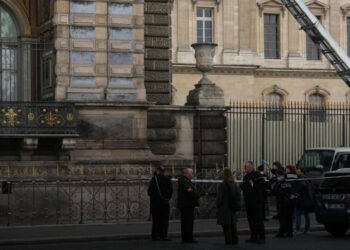Israel and Lebanon engaged in a fierce exchange of fire on Sunday, with Israeli warplanes conducting the most intense bombing in nearly a year of conflict across southern Lebanon, while Hezbollah reported launching rocket strikes on military sites in northern Israel.
Israel hits 290 Hezbollah targets; destroy rocket launcher barrels
The Israeli military reported hitting approximately 290 targets on Saturday, which included numerous Hezbollah rocket launcher barrels, and announced plans to keep targeting the Iran-supported group.
Israel shut down schools and limited gatherings in numerous northern regions, as well as in the Israeli-held Golan Heights, at the beginning of Sunday.
Israeli military stated that numerous rockets and missiles were launched from Lebanon and Iraq, with most being intercepted by their aerial defence systems while sirens blared throughout the night.
Also read: ‘If they have not understood the message…’: Netanyahu’s warning to Hezbollah
Hezbollah claims it targeted Israeli airbase with numerous missiles
Hezbollah claimed it fired numerous missiles at the Israeli Ramat David Airbase in retaliation for “repeated Israeli strikes on Lebanon”, according to a post on its Telegram channel early Sunday.
The continuous waves of rocket assaults carried out by Hezbollah at Ramat David are the most severe attacks it has claimed since the conflict started.
The increasing assaults occurred in under 48 hours following an Israeli airstrike that targeted Hezbollah commanders and resulted in the deaths of at least 37 individuals in a suburb of the Lebanese capital, as reported by authorities.
Also read: Hezbollah commander Ibrahim Aqil dies in Israeli air attack: Report
Hezbollah, a strong organization supported by Iran, reported that 16 individuals, including senior leader Ibrahim Aqil and another leader, Ahmed Wahbi, were killed on Friday in the most deadly attack in almost a year of fighting with Israel.
The conflict significantly worsened on Friday due to the strike, dealing another blow to Hezbollah following two days of attacks that resulted in the detonation of pagers and walkie-talkies used by its members.
US National Security Adviser expresses concern about escalation
Jake Sullivan, the U.S. national security adviser, expressed concern about escalation but believed that the Israeli assassination of a prominent Hezbollah figure provided justice to the group, recognized by Washington as terrorists.
“While the risk of escalation is real, we actually believe there is also a distinct avenue to getting to a cessation of hostilities and a durable solution that makes people on both sides of the border feel secure,” Sullivan told reporters.
Lebanese Prime Minister Najib Mikati cancelled a planned trip to the U.N. General Assembly in New York.
Hezbollah says it would continue battling Israel until it accepts a ceasefire in Gaza war
Hezbollah has stated that it would continue battling Israel until it accepts a ceasefire in the conflict with Hamas in Gaza, which was started by a Hamas attack in southern Israel on October 7th.
Also read: Israel strikes Hezbollah sites in southern Lebanon after Hezbollah leader warns of retaliation
American officials believe it is improbable in the near future. Israel desires for Hezbollah to stop fighting and retreat its troops from the border area, following a U.N. resolution agreed upon with Israel in 2006, without considering any agreement regarding Gaza.
Israeli Defence Minister Yoav Gallant, who said last week Israel was launching a new phase of war on the northern border, posted on X: “The sequence of actions in the new phase will continue until our goal is achieved: the safe return of the residents of the north to their homes.”
Since Hezbollah began launching rockets at Israel in solidarity with Palestinians in Gaza, tens of thousands of individuals have fled their homes on the Israel-Lebanon border.
Also read: Israeli Defence Minister announces ‘new phase of war’ following Hezbollah pagers explosion
A statement released from a U.S. summit led by President Joe Biden with the leaders of Japan, India and Australia emphasized the importance of stopping the Gaza conflict “from getting worse and spreading to other areas” without directly addressing the Israel-Hezbollah dispute.
The death toll in Lebanon has risen to over 740 since October, with at least 70 people killed in the past week, marking the deadliest Israel-Hezbollah escalation since 2006.













